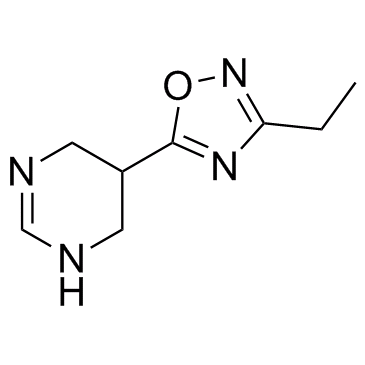| Description |
CDD0102 is a potent M1 Muscarinic receptor agonist.
|
| Related Catalog |
|
| Target |
mAChR[1]
|
| In Vitro |
CDD0102 (CDD-0102) is an efficacious muscarinic agonist in cell lines expressing M1 receptors. CDD0102 displays much lower activity at M3 and M5 receptors[1].
|
| In Vivo |
After i.p. injections, CDD0102 (CDD-0102) crosses the blood-brain barrier (BBB) in a dose-dependent manner. In toxicological studies, the LD50 of CDD0102 is 190 mg/kg following i.p. injections and greater than 1,000 mg/kg following oral administration. In follow-up studies, after oral administration at a dose of 10 mg/kg, CDD0102 fully reverses memory deficits associated with IgG-192 saporin administration. Again, no side effects are observed at this dose[1].
|
| Cell Assay |
A9 L cells expressing muscarinic receptor subtypes are cultured. Biochemical studies examine the ability of compounds (e.g., CDD0102, 0.01 nM, 0.1 nM, 1 nM, 10 nM, 100 nM, 1 μM, 10 μM, 100 μM and 1 mM) to stimulate relevant biochemical responses through muscarinic receptors expressed in A9 Lcells. Assays of PI metabolism provides a measure of in vitro activity associated with M1, M3, and M5 receptor activation, while inhibition of adenylyl cyclase activity determined efficacy at M2 and M4 receptors[1].
|
| Animal Admin |
Mice[1] Young, male CF-1 mice are administered CDD0102 or xanomeline by either p.o. or i.p. injection with doses from 1 to 1,000 mg/kg by each route, and monitored for 24 h. Animals are observed daily for 1 wk for appearance of delayed toxicity. A second set of animals is treated with a narrow range of concentrations based on the preliminary studies to determine the LD50.
|
| References |
[1]. Messer WS Jr. The utility of muscarinic agonists in the treatment of Alzheimer's disease. J Mol Neurosci. 2002 Aug-Oct;19(1-2):187-93.
|
